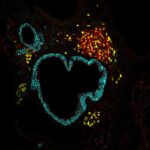
Publication: Nfkbie-deficiency leads to increased susceptibility to develop B-cell lymphoproliferative disorders in aged mice
Published in: Blood Cancer Journal, 2020, 10 (3), pp.38. ⟨10.1038/s41408-020-0305-6⟩
Authors: Veronique Della-Valle, Damien Roos-Weil, Laurianne Scourzic, Enguerran Mouly, Zakia Aid, Walaa Darwiche, Yann Lécluse, Frederik Damm, Sylvie Mémet, Thomas Mercher, Said Aoufouchi, Florence Nguyen-Khac, Olivier Bernard, Hussein Ghamlouch
Summary
Aberrant NF-κB activation is a hallmark of most B-cell malignancies. Recurrent inactivating somatic mutations in the NFKBIE gene, which encodes IκBε, an inhibitor of NF-κB-inducible activity, are reported in several B-cell malignancies with highest frequencies in chronic lymphocytic leukemia and primary mediastinal B-cell lymphoma, and account for a fraction of NF-κB pathway activation. The impact of NFKBIE deficiency on B-cell development and function remains, however, largely unknown. Here, we show that Nfkbie-deficient mice exhibit an amplification of marginal zone B cells and an expansion of B1 B-cell subsets. In germinal center (GC)-dependent immune response, Nfkbie deficiency triggers expansion of GC B-cells through increasing cell proliferation in a B-cell autonomous manner. We also show that Nfkbie deficiency results in hyperproliferation of a B1 B-cell subset and leads to increased NF-κB activation in these cells upon Toll-like receptor stimulation. Nfkbie deficiency cooperates with mutant MYD88 signaling and enhances B-cell proliferation in vitro. In aged mice, Nfkbie absence drives the development of an oligoclonal indolent B-cell lymphoproliferative disorders, resembling monoclonal B-cell lymphocytosis. Collectively, these findings shed light on an essential role of IκBε in finely tuning B-cell development and function.
Link to Pubmed [PMID] – 32170099
Link to HAL – sorbonne-universite-02540206
Link to DOI – 10.1038/s41408-020-0305-6

